In one of my automation tests, I am importing a date format stored in the environment parameters, use it for my test and then increment it by one second after the test is executed. This is the code:
afterEach(()=>{
var startTimeStamp = Cypress.env('aestartTimestamp');
var startTimestampString = String(startTimeStamp);
var epochStartTimeStamp = new Date(startTimestampString);
var startYear = epochStartTimeStamp.getFullYear();
var month = (epochStartTimeStamp.getMonth())+1;
var realStartMonth = month <=9 ? '0'+month:month;
var startDate = epochStartTimeStamp.getDate()<=9 ? '0'+epochStartTimeStamp.getDate():epochStartTimeStamp.getDate();
var startHours = epochStartTimeStamp.getHours() <=9 ? '0'+epochStartTimeStamp.getHours():epochStartTimeStamp.getHours();
var startMinutes = epochStartTimeStamp.getMinutes() <=9 ? '0'+epochStartTimeStamp.getMinutes():epochStartTimeStamp.getMinutes();
var startSeconds = (epochStartTimeStamp.getSeconds()+1)<=9? '0'+(epochStartTimeStamp.getSeconds()+1):(epochStartTimeStamp.getSeconds()+1);
var newStartTimeStamp = startYear+"-"+realStartMonth+"-"+startDate+" "+startHours+":"+startMinutes+":"+startSeconds;
Cypress.env('aestartTimestamp',newStartTimeStamp);
console.log(newStartTimeStamp);
var endTimeStamp = Cypress.env('aeendTimestamp');
var endTimeStampString = String(endTimeStamp);
var epochEndTimeStamp = new Date(endTimeStampString);
var endYear = epochEndTimeStamp.getFullYear();
var endMonth = (epochEndTimeStamp.getMonth())+1;
var realEndMonth = endMonth <=9 ? '0'+endMonth:endMonth;
var endDate = epochEndTimeStamp.getDate()<=9 ? '0'+epochEndTimeStamp.getDate():epochEndTimeStamp.getDate();
var endHours = epochEndTimeStamp.getHours() <=9 ? '0'+epochEndTimeStamp.getHours():epochEndTimeStamp.getHours();
var endMinutes = epochEndTimeStamp.getMinutes() <=9 ? '0'+epochEndTimeStamp.getMinutes():epochEndTimeStamp.getMinutes();
var endSeconds = (epochEndTimeStamp.getSeconds()+1) <=9 ? '0'+(epochEndTimeStamp.getSeconds()+1):(epochEndTimeStamp.getSeconds()+1);
var newEndTimestamp = endYear+"-"+realEndMonth+"-"+endDate+" "+endHours+":"+endMinutes+":"+endSeconds;
Cypress.env('aeendTimeStamp',newEndTimestamp);
console.log(newEndTimestamp);
})
However, after running the tests, the date gets converted to NaN. This is what I see in the console:
The timestamp is converted to NaN.
When I run the code independently in any browser console, I see that the code works just perfectly. (The new time stamp is incremented by 1 second).
So I am mystified as to why the code works properly in the dev console but not in the Cypress. Test. Is there something missing?
